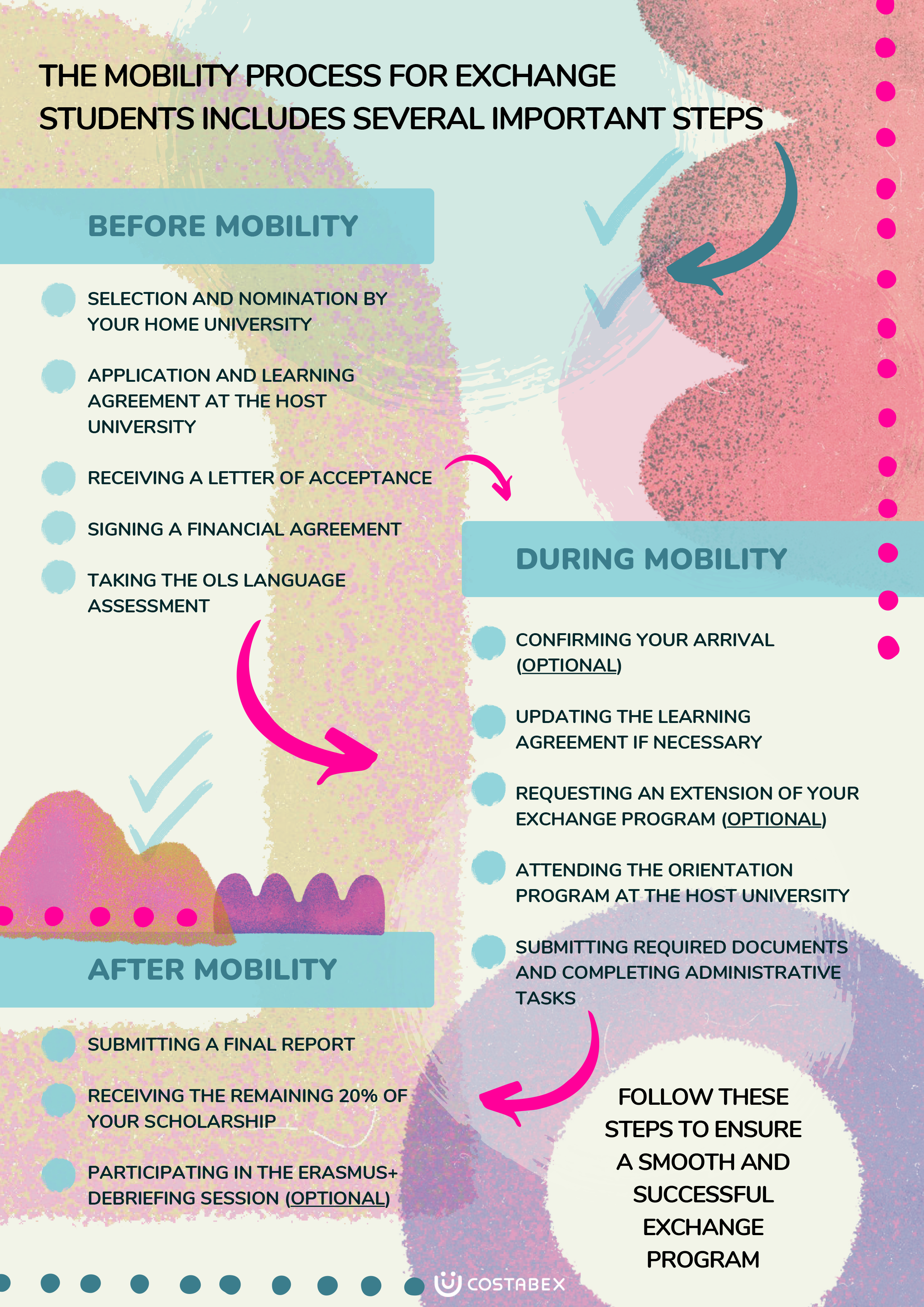Here you will find everything you need to know about your stay abroad from the administrative point of view – documents and important steps throughout the various stages of your mobility.
You’ll see – going abroad is not so complicated as long as you know what to expect!
BEFORE MOBILITY
- Selection. If you are reading this, it means you have successfully passed the selection, congratulations!
- Nomination. Once you are selected to study abroad, your home University’s outgoing student coordinator nominates you to your soon-to-be host (or Receiving) institution. After it’s done, you are informed about the further application steps by the Receiving institution. We suggest you wait for the email (unless instructed otherwise) and not complete any documentation and applications before you receive further instructions.
- Application and Learning Agreement (LA). LA is an essential document for your mobility. It contains your study plan – courses that you will study abroad together with courses that will be recognised or replaced at your home university. Make sure that you complete this stage very carefully, and as early as possible, leaving time for corrections, if necessary.
- Letter of Acceptance. Once your application at the Receiving institution is done, you‘ll receive a letter of Acceptance. Do not forget to forward it to your coordinators at home! This document proves that you are officially accepted as an exchange student at the host University and indicates the period of your studies – which is necessary for us to calculate your scholarship.
- Financial agreement. The financial agreement is signed at the very end of the preparatory stage and confirms the final sum of your Erasmus+ scholarship. In most institutions, the scholarship is transferred before the departure. In some institutions, it is done in two payments: 80% of the whole sum is paid before your mobility and the remaining 20% – after your mobility. The details are specified in the financial agreement, so make sure you read it carefully and sign it before you go abroad!
- OLS test. Taking OLS language assessment in the language of mobility is required (or recommended – depends on the university) for all Erasmus+ students. The test checks whether a student has the required language level, but don‘t worry – test results will not prevent you from taking part in mobility. On the contrary – it provides students with an opportunity to improve their language skills.

DURING MOBILITY
- Confirmation of arrival (optional, depends on an institution) – a paper or digital document signed the first days after your arrival. Ask your home university whether they require this document!
- Changes to LA. If anything changes during your mobility, you need to receive permission from both the home and host universities to update the LA. The reasons for updating LA can be:
- The course is not available anymore,
- The course is not taught in another language than previously specified;
- Timetable conflict;
- Substituting a deleted component;
- Extending the mobility period;
Once permission is given, you need to fill out the LA “During the mobility” form, collect the necessary signatures and provide it to the host institution to implement the updates. Please note that most universities give no more than 5 weeks to update your study plan!
- Mobility extension (optional). If you’d like to stay at the host university one more semester, you should ask for permission from your home university first. Please keep in mind that Erasmus+ study period should not exceed the total duration of 12 months within one study cycle. The decision is made for each case individually, depending on the granted budget, mobility quotas specified in the Inter-Institutional agreement with the Host institution, etc. And if permission is granted, do not forget to contact the host institution for more information about their requirements, deadlines, etc.
AFTER MOBILITY
- Confirmation/certificate of stay. Confirmation of stay or certificate of attendance is one of the most important mobility documents as it confirms the actual mobility period and is necessary to calculate the final sum of your Erasmus+ scholarship. Do not forget to visit the responsible persons at the host institution and ask for this document before your departure!
- Transcript of Records (ToR). ToR is the document that contains all grades you received during your mobility. This document is usually required by both International Office and the academic coordinator at your home university, so remember to forward it to them as soon as you receive it! Remember – your ToR should be in line with your LA!
- 2nd OLS Test (If applicable). If the language proficiency level is C2 before the mobility, the 2nd test is not necessary.
- EU Survey. EU survey is automatically sent before the end of mobility. Survey results provide valuable information to Erasmus+ Programme and evaluate how mobility participants experienced their studies abroad.
- It is very important to deliver all documents! Some universities keep the right not to transfer the remaining part of the scholarship until all required documents are presented to the International Office.
It was the summary of the Erasmus+ mobility process and required documents. Some universities might have additional requirements or tasks to take care of, so follow their information and most importantly – do not postpone everything to the last minute!
Most likely, you’ll receive reminders from both the home and host institutions, so no need to worry if you don’t remember it all right away.
Useful resources:
Erasmus+ App https://erasmusapp.eu/
